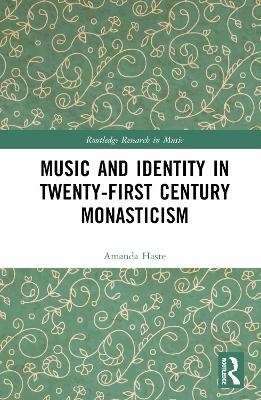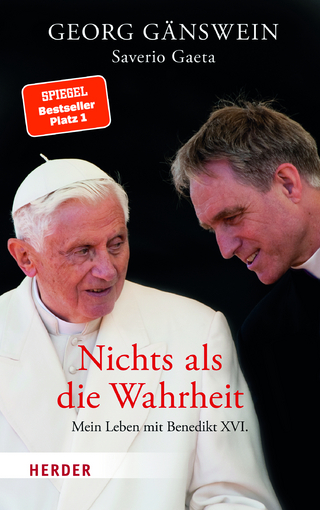
Music and Identity in Twenty-First-Century Monasticism
Routledge (Verlag)
978-1-032-44178-8 (ISBN)
Twenty-first-century monastic communities represent unique social environments in which music plays an integral part. This book examines the role of music in Catholic, Anglican/Episcopalian and neo-monastic communities in Britain and North America, engaging closely with communities of practice to provide a penetrating insight into the role of music in self-care and as a vector for identity construction on both individual and community levels. The author explores the essential role of music in community dynamics, the rationale for using instruments, the implications of both chant-based and freestyle composition, gender-related differences in musical activity, the role of dance (‘music made visible’) in community life, the commodification of monastic music, the ‘Singing Nun’ phenomenon and the role of music in established and emerging neo-monastic communities. The result is a comprehensive and compelling study of the agency of music in the construction and expression of personal and community identity.
Amanda J. Haste is an Anglo-French musician, musicologist, linguist and independent researcher, whose published work focuses on identity construction through music and language. She teaches in the music department of Aix-Marseille University, France, and until 2022 also served as president of the international non-profit National Coalition of Independent Scholars.
INTRODUCTION
CURRENT LITERATURE
ABOUT THE AUTHOR
TERMINOLOGY
Chant
Modal language
Monastic Life
WORKS CITED
1. CONFLICT AND REPARATION: THE AGENCY OF MUSIC IN MODERN MONASTIC COMMUNITY DYNAMICS
INTRODUCTION
JOINING A COMMUNITY
COMMUNITY BONDING
SOLIDARITY
EMOTIONAL EXPRESSION
ELITISM AND EXCLUSION
CONFLICT AND REPARATION
CONCLUSION
NOTES
WORKS CITED
2. NEW DIRECTIONS: ENCODING MONASTIC IDENTITY THROUGH MUSICAL COMPOSITION
INTRODUCTION
COMPOSITION: CHANTS OLD AND NEW
Drawing on the canon. Case study: 1: Fr John-Julian OJN and Sr Cornelia OJN
ADAPTATION OR COMPOSITION?
Breaking the rules. Case study 2: Sr Cintra Pemberton OSH
Responding to new texts. Case study 3: Sr Mary Gregory OSB
MUSICAL INFLUENCES
TONALITY VERSUS MODALITY
APPROPRIATENESS
Reception within Community
Reception beyond Community
NOTATIONAL ENCODING
CONCLUSION
NOTES
WORKS CITED
3. DEAD TO THE WORLD: NEGOTIATING PERSONAL AND MONASTIC IDENTITY THROUGH INSTRUMENTAL AND RECREATIONAL MUSIC
INTRODUCTION
ACCOMPLISHED SECULAR MUSICIANS
INSTRUMENTAL USE IN WORSHIP
Accompanying instruments
Melodic instruments
ASSOCIATION AND ALLEGORISATION
RECONTEXTUALISATION
INSTRUMENTAL MUSIC AS RITUAL
MEDIUM OR MESSAGE?
MUSIC FOR RECREATION
CONCLUSION
NOTES
WORKS CITED
4. DANCING MY PRAYER, DANCING MY SELF: EMBODIED AND PERFORMED IDENTITY
INTRODUCTION
DANCING IN A WORSHIP CONTEXT
Who Dances?
Which Dances?
Why Dance?
Why Not Dance?
DANCE AS OUTREACH
Reception within Community
Reception beyond Community
Efficacy in embodying ‘felt’ interiority
CONCLUSION
NOTES
WORKS CITED
5. A THIRD GENDER?: EXPRESSION OF GENDER IDENTITY IN CELIBATE MONASTICISM THROUGH WORDS AND MUSIC
INTRODUCTION
GENDER ISSUES IN MUSICAL COMPOSITION
Textual themes and imagery
Sexuality and relationships
Creativity and Procreativity Metaphors
Textual Response
EVALUATION AND RECEPTION
CONCLUSION
NOTES
WORKS CITED
6. BUYING INTO THE MONASTIC EXPERIENCE: MUSICAL COMMODIFICATION
INTRODUCTION
MONASTICS AND COMMERCE
MONASTIC MUSIC AND AUTHENTICITY
PRAYER OR PERFORMANCE?
MUSIC AS PRODUCT
Marketing the Chant
PRODUCT AUTHENTICITY
The Benedictines of Mary, Queen of Apostles
The Community of the Resurrection
The Brothers of the Society of St John the Evangelist
MEDIUM OR MESSAGE?
CONCLUSION
NOTES
WORKS CITED
7. THE SINGING NUN PHENOMENON: GOING SOLO ON THE WORLD STAGE
INTRODUCTION
CASE STUDIES
Sister Jeanne Decker
Sr Janet Mead
Brother Alessandro Brustenghi
Sister Cristina Scuccia
DISCUSSION
Disembodied and embodied voices
"Are You for Real?" Appearance and Authenticity
Naming and Identity
Critical Reception – voice and singing style
Choice of musical content
Leading a Double Life
The Power of Song
Monasticism and the Common Good
CONCLUSION
NOTES
WORKS CITED
8. FORGING AN ANGLICAN MUSICAL IDENTITY
INTRODUCTION
HISTORICAL BACKGROUND
MUSICAL DEVELOPMENT
MUSICAL SETTINGS
The English Tradition
Establishing a Chant Tradition
An English Plainchant Tradition
DISCUSSION
CONCLUSION
NOTES
WORKS CITED
9. FRESH EXPRESSIONS: MUSIC IN NEO-MONASTIC COMMUNITIES
INTRODUCTION
FORMS OF NEO-MONASTICISM
EXAMPLES OF EMERGING NEO-MONASTIC COMMUNITIES
ESTABLISHED COMMUNITIES WITH A STRONG MUSICAL TRADITION
Iona Community
Taizé Community
THE PLACE OF MUSIC IN OTHER NEO-MONASTIC COMMUNITIES
Hilfield Community
Scargill Community, Yorkshire
St. Anselm Community
Community of Aidan and Hilda
DISCUSSION
Proximity
Influential Individuals
Musical gifts within Community
The Call to Tradition
Musical Identity: Developing a Community Voice
Permanence and Durability
Boundary Clarity and Personal Identity
CONCLUSION
NOTES
WORKS CITED
CONCLUSION
INDEX
| Erscheinungsdatum | 24.10.2023 |
|---|---|
| Reihe/Serie | Routledge Research in Music |
| Zusatzinfo | 1 Tables, black and white; 13 Halftones, black and white; 13 Illustrations, black and white |
| Verlagsort | London |
| Sprache | englisch |
| Maße | 156 x 234 mm |
| Gewicht | 494 g |
| Themenwelt | Kunst / Musik / Theater ► Musik ► Klassik / Oper / Musical |
| Religion / Theologie ► Christentum ► Kirchengeschichte | |
| ISBN-10 | 1-032-44178-X / 103244178X |
| ISBN-13 | 978-1-032-44178-8 / 9781032441788 |
| Zustand | Neuware |
| Informationen gemäß Produktsicherheitsverordnung (GPSR) | |
| Haben Sie eine Frage zum Produkt? |
aus dem Bereich


